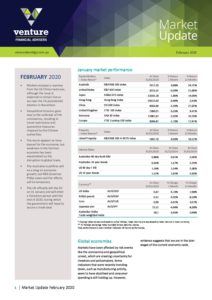The Pulse

• Markets enjoyed a reprieve from the US-China trade war, although the issue is expected to remain live as we near the US presidential election in November.
• Geopolitical tensions gave way to the outbreak of the coronavirus, resulting in travel restrictions and quarantine measures imposed by the Chinese authorities.
• The worst appears to have passed for the eurozone, but weakness in the German economy has been exacerbated by the disruption to global trade.
• The Australian bushfires will be a drag on economic growth, but RBA Governor Philip Lowe said the effects will be temporary.
• The UK officially left the EU on 31 January and will enter a transition period until the end of 2020, during which the government will need to secure a trade deal.
Global economies
Markets have been affected by risk events like the coronavirus and geopolitical unrest, which are creating uncertainty for investors and policymakers.
US
The risk of a further escalation in the trade war has been averted for now, but a full resolution remains unlikely until at least 2021. Removal of existing tariffs is conditional on achieving the targeted increase in US imports over 2020-21, meaning trade tensions are unlikely to disappear anytime soon.
Europe
The German statistics office reported that GDP grew by only 0.6% in 2019, down from 1.5% in 2018 and 2.5% in 2017. The Government expects growth to pick up to 1.0% in 2020 having cut its forecast from 1.5% in October.
China
The outbreak of the coronavirus in Wuhan and its spread to 27 other countries has resulted in travel restrictions and quarantine measures to prevent a pandemic.
Asia region
The Asia region has been supported with accommodative monetary policy, with the central banks of South Korea and India both cutting interest rates in October 2019.
Australia
The Australian economy grew at 1.7% in the September quarter and most likely less than 2.0% in the December quarter, well below the growth rate required to lift wages and inflation and to keep unemployment from rising.